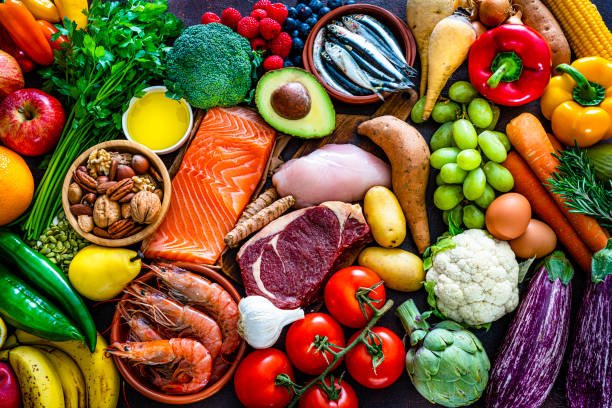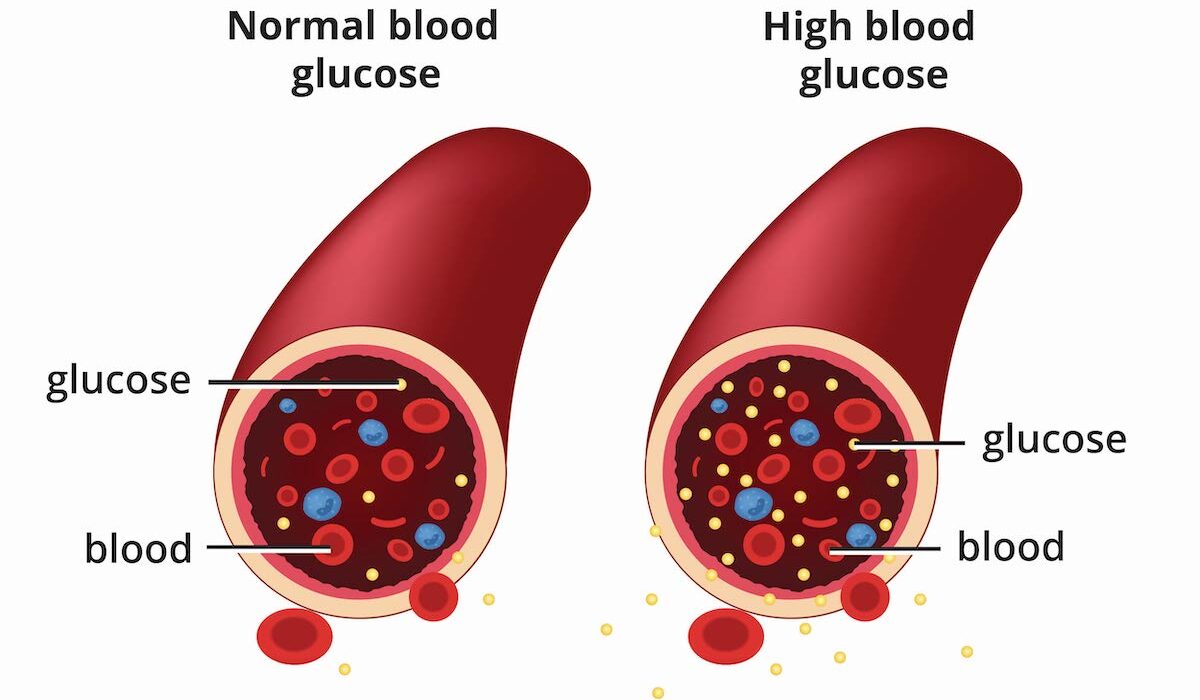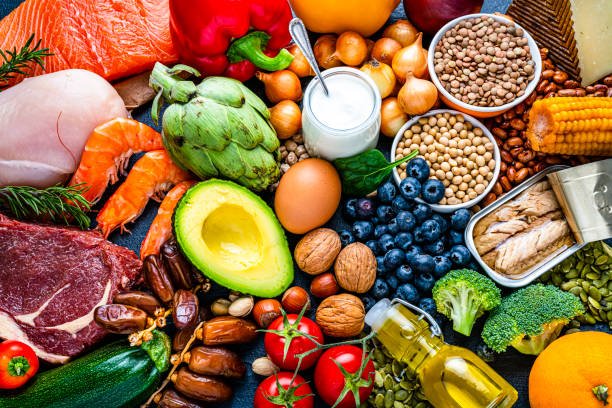Inflammation is one of the body’s most remarkable defense mechanisms—a biological alarm system that activates when we are injured or exposed to infection. In its acute form, it is lifesaving, helping us heal wounds and fight bacteria. But when inflammation becomes chronic, smoldering quietly beneath the surface, it transforms into a silent threat. Chronic inflammation has been linked to heart disease, diabetes, cancer, arthritis, Alzheimer’s disease, and even depression.
Fortunately, science shows us that food is not only fuel—it is medicine. Some foods fan the flames of inflammation, while others soothe them, calming the immune system and protecting the body. A diet rich in anti-inflammatory foods nourishes the body at the cellular level, reduces oxidative stress, and promotes resilience against disease. Below are ten of the most powerful anti-inflammatory foods, each one backed by research and steeped in both scientific evidence and centuries of traditional wisdom.
1. Fatty Fish: Omega-3 Powerhouses
Few foods are as celebrated in scientific literature as fatty fish when it comes to reducing inflammation. Salmon, sardines, mackerel, anchovies, and herring are loaded with omega-3 fatty acids, particularly eicosapentaenoic acid (EPA) and docosahexaenoic acid (DHA). These compounds act as raw materials for the body to create specialized molecules called resolvins and protectins, which actively reduce inflammation and help repair tissue.
Clinical studies have consistently shown that omega-3s lower levels of inflammatory markers such as C-reactive protein (CRP) and interleukin-6 (IL-6). They are especially beneficial for people with chronic conditions like rheumatoid arthritis, where supplementation with fish oil reduces joint pain and stiffness. Moreover, omega-3s improve heart health, lower triglycerides, and may even protect brain function as we age.
For the most powerful anti-inflammatory effect, experts recommend at least two servings of fatty fish per week. For those who don’t eat fish, algae-based omega-3 supplements provide a plant-based alternative.
2. Berries: Tiny Fruits, Big Impact
Berries may look delicate, but they are nutritional giants. Blueberries, strawberries, raspberries, and blackberries are packed with vitamins, fiber, and antioxidants—especially anthocyanins, the plant compounds that give berries their vivid colors.
Anthocyanins and other polyphenols in berries help lower oxidative stress and suppress the production of pro-inflammatory cytokines. Clinical trials show that eating berries can reduce markers of inflammation, improve cholesterol profiles, and even enhance insulin sensitivity.
For example, a study in obese adults found that consuming blueberries daily led to significant reductions in CRP levels. Another trial showed that strawberries improved vascular function in people with metabolic syndrome. The benefits extend to the brain as well: diets high in berries are associated with slower cognitive decline and protection against age-related memory loss.
A cup of berries a day—whether fresh, frozen, or blended into a smoothie—offers a delicious way to fight inflammation naturally.
3. Leafy Greens: Nature’s Healing Leaves
Spinach, kale, Swiss chard, collard greens, and arugula are among the most nutrient-dense foods on earth. These dark leafy greens provide vitamins A, C, E, and K, as well as minerals like magnesium, calcium, and iron. But their most powerful contribution to anti-inflammatory health lies in their abundance of antioxidants and phytochemicals.
Greens are rich in carotenoids (such as lutein and beta-carotene) and flavonoids, which protect cells from oxidative stress. They also supply nitrates, which improve blood vessel function and lower blood pressure.
Research shows that people who consume high amounts of leafy greens have lower levels of inflammatory markers and reduced risk of chronic diseases. Magnesium, in particular, has anti-inflammatory properties; deficiency is associated with higher CRP levels.
Adding a handful of greens to salads, soups, or smoothies daily is a simple but profound step toward an anti-inflammatory lifestyle.
4. Olive Oil: The Liquid Gold of Health
Olive oil, the cornerstone of the Mediterranean diet, has earned its reputation as “liquid gold” for health. Extra virgin olive oil (EVOO) is particularly rich in monounsaturated fats and antioxidants, most notably oleocanthal—a compound shown to work similarly to ibuprofen in reducing inflammation.
Studies link olive oil consumption to lower risks of heart disease, diabetes, and even some cancers. It reduces CRP levels, improves endothelial function, and protects LDL cholesterol from oxidative damage. One large clinical trial, the PREDIMED study, demonstrated that people following a Mediterranean diet enriched with EVOO had significantly lower rates of cardiovascular disease compared to those on a low-fat diet.
Using olive oil as the primary fat for cooking and dressing is not just delicious but scientifically proven to support anti-inflammatory health.
5. Turmeric: The Golden Spice of Healing
Turmeric, with its vibrant golden hue, has been used in Ayurvedic and Chinese medicine for thousands of years. Its power comes from curcumin, a bioactive compound with strong anti-inflammatory and antioxidant properties.
Curcumin targets multiple inflammatory pathways in the body. It inhibits NF-kB, a molecule that activates genes linked to inflammation, and lowers levels of inflammatory cytokines. Clinical studies show that curcumin supplements can reduce joint pain in arthritis patients, ease symptoms of inflammatory bowel disease, and even improve markers of metabolic health.
However, curcumin is not easily absorbed by the body. Combining it with black pepper, which contains piperine, can enhance absorption by up to 2000%. Cooking turmeric into curries, soups, teas, or golden milk is a flavorful way to reap its benefits.
6. Green Tea: Ancient Brew, Modern Science
Green tea has been revered in Asia for centuries as a tonic for health and longevity. Today, modern research confirms its extraordinary anti-inflammatory potential. The secret lies in its polyphenols, especially epigallocatechin gallate (EGCG).
EGCG reduces inflammation by inhibiting pro-inflammatory molecules and protecting cells from oxidative stress. Studies show that green tea lowers CRP levels, improves insulin sensitivity, and reduces risk factors for heart disease and cancer. Some research even suggests it may protect brain cells from degeneration, lowering the risk of Alzheimer’s and Parkinson’s disease.
Drinking two to three cups of green tea daily—or even incorporating matcha, a powdered form of whole green tea leaves—offers a potent way to calm inflammation while refreshing the mind.
7. Nuts: Small Packages, Big Benefits
Almonds, walnuts, pistachios, and hazelnuts may be small, but they pack an enormous nutritional punch. Nuts are excellent sources of healthy fats, plant protein, fiber, vitamins, and minerals. Walnuts, in particular, are rich in alpha-linolenic acid (ALA), a plant-based omega-3 fatty acid.
Regular nut consumption has been shown to lower inflammatory markers, reduce oxidative stress, and improve heart health. In one study, people who ate a handful of walnuts daily had significantly reduced CRP and IL-6 levels. Nuts also promote healthy cholesterol levels and support weight management, which indirectly lowers inflammation.
Eating a small handful of unsalted nuts each day is a science-backed way to protect the heart and keep inflammation at bay.
8. Tomatoes: Juicy Antioxidant Giants
Tomatoes are not just juicy and delicious; they are among the richest dietary sources of lycopene, a powerful antioxidant with anti-inflammatory effects. Lycopene is particularly effective at reducing oxidative stress in the lungs and vascular system.
Studies show that lycopene lowers CRP levels and reduces the risk of chronic diseases such as heart disease and cancer. Cooking tomatoes—such as in sauces or soups—increases the bioavailability of lycopene, making it easier for the body to absorb.
Tomatoes also provide vitamin C, potassium, and folate, all of which contribute to overall health. Eating tomatoes regularly, whether fresh, roasted, or blended into a sauce, offers delicious protection against inflammation.
9. Garlic and Onions: Pungent Protectors
Garlic and onions may sting the eyes when chopped, but they work wonders inside the body. Both are rich in sulfur-containing compounds that support the immune system and reduce inflammation.
Allicin, the active compound in garlic, has antimicrobial and anti-inflammatory effects. It helps lower CRP and other inflammatory markers, supports cardiovascular health, and may even reduce cancer risk. Onions, meanwhile, are high in quercetin, a flavonoid with powerful antioxidant and anti-inflammatory properties.
Studies show that diets rich in allium vegetables (garlic, onions, leeks) are associated with lower risks of chronic diseases, particularly heart disease and certain cancers. Adding garlic and onions to daily meals is an ancient practice now firmly backed by modern science.
10. Dark Chocolate: A Sweet Anti-Inflammatory Treat
Yes, dessert can be anti-inflammatory—if it’s dark chocolate. Cocoa is one of the richest sources of polyphenols, particularly flavanols, which have strong antioxidant and anti-inflammatory effects.
Clinical studies show that consuming dark chocolate (with at least 70% cocoa content) can lower CRP levels, improve endothelial function, and reduce blood pressure. It also supports brain health by improving blood flow to the brain and enhancing memory.
However, moderation is key. Many commercial chocolates are high in sugar and fat, which counteract the benefits. Choosing high-quality dark chocolate or unsweetened cocoa powder ensures that this indulgence remains a healthy anti-inflammatory ally.
The Bigger Picture: Anti-Inflammatory Eating as a Lifestyle
While each of these foods has unique benefits, the most powerful anti-inflammatory effect comes from the overall dietary pattern. Diets rich in fruits, vegetables, whole grains, lean proteins, healthy fats, and spices—such as the Mediterranean diet—consistently reduce inflammation and protect against chronic disease.
Equally important is limiting foods that drive inflammation, such as refined carbohydrates, sugary drinks, processed meats, and trans fats. The balance between pro-inflammatory and anti-inflammatory foods determines whether the body’s internal fire burns brightly with disease or glows gently with vitality.
Final Thoughts
Health is built one bite at a time. Fatty fish, berries, leafy greens, olive oil, turmeric, green tea, nuts, tomatoes, garlic and onions, and dark chocolate are more than delicious—they are science-backed allies in the fight against chronic inflammation. Together, they form the building blocks of a diet that nourishes, heals, and protects.
When we choose these foods, we are not just feeding our bodies—we are feeding resilience, longevity, and the ability to live life with energy and joy. The science is clear: food is not only fuel, it is one of the most powerful medicines we will ever have.






